- Home
- Stephen R. Donaldson
The King's Justice
The King's Justice Read online
The Last Chronicles of Thomas Covenant
The Runes of the Earth
Fatal Revenant
Against All Things Ending
The Last Dark
The Chronicles of Thomas Covenant the Unbeliever
Lord Foul’s Bane
The Illearth War
The Power That Preserves
The Second Chronicles of Thomas Covenant
The Wounded Land
The One Tree
White Gold Weilder
G. P. PUTNAM’S SONS
Publishers Since 1838
An imprint of Penguin Random House LLC
375 Hudson Street
New York, New York 10014
Copyright © 2015 by Stephen R. Donaldson
Penguin supports copyright. Copyright fuels creativity, encourages diverse voices, promotes free speech, and creates a vibrant culture. Thank you for buying an authorized edition of this book and for complying with copyright laws by not reproducing, scanning, or distributing any part of it in any form without permission. You are supporting writers and allowing Penguin to continue to publish books for every reader.
Library of Congress Cataloging-in-Publication Data
Donaldson, Stephen R.
[Short stories. Selections]
The king’s justice: two novellas / Stephen R. Donaldson.
p. cm.
ISBN 978-0-698-41177-7
I. Title.
PS3554.O469A6 2015 2015015843
813'.54—dc23
This is a work of fiction. Names, characters, places, and incidents either are the product of the author’s imagination or are used fictitiously, and any resemblance to actual persons, living or dead, businesses, companies, events, or locales is entirely coincidental.
Version_1
For Jennifer Dunstan
who made it all possible.
Acknowledgments
My particular thanks to Susan Allison, who has helped me with some rather challenging books, and has been consistently supportive along the way.
Contents
Other Titles by Stephen Donaldson
Title Page
Copyright
Dedication
Acknowledgments
THE KING’S JUSTICE
THE AUGUR’S GAMBIT
he man rides his horse along the old road through the forest in a rain as heavy as a damask curtain—a rain that makes dusk of midafternoon. The downpour, windless, strikes him from the long slash of open sky that the road cuts through the trees. It makes a sound like a waterfall among the leaves and branches, a damp roar that deafens him to the slap of his mount’s hooves. Ahead it blinds him to the road’s future. But he is not concerned. He knows where he is going. The broad brim of his leather hat and the oiled canvas of his cloak spare him from the worst of the wet, and in any case he has ridden in more frightening weather, less natural elements. His purpose is clear.
Shrouded by the deluge and covered by his dark gear, he looks as black as the coming night—a look that suits him, though he does not think about such things. Having come so far on this journey, and on many others, he hardly thinks at all as he rides. Brigands are no threat to him, even cutthroats desperate enough to hunt in this rain. Only his destination matters, but even that does not require thought. It will not until he reaches it.
Still his look does suit him. Black is the only name to which he answers. Many years ago, in a distant region of the kingdom, he had a name. His few comrades from that time—all dead now—knew him as Coriolus Blackened. But he has left that name behind, along with other pieces of who he once was. Now he is simply Black. Even his title rarely intrudes on who he has become, though it defines him.
He and his drenched horse are on this road because it leads to a town—so he has been told—called Settle’s Crossways. But he would have taken the same road for the same purpose without knowing the name of the place. If Settle’s Crossways had been a village, or a hamlet, or even a solitary inn rather than a town, he would still have ridden toward it, though it lies deep in the forests that form the northern border of the kingdom. He can smell what he seeks from any distance. Also the town is a place where roads and intentions come together. Such things are enough to set and keep him on his mount despite the pounding rain and the gloom under the trees.
He is Black. Long ago, he made himself, or was shaped, into a man who belongs in darkness. Now no night scares him, and no nightmare. Only his purpose has that power. He pursues it so that one day it will lose its sting.
A vain hope, as he knows well. But that, too, does not occupy his thoughts. That, too, he will not think about until he reaches his destination. And when he does think about it, he will ignore himself. His purpose does not care that he wants it to end.
The road has been long to his horse, though not to Black, who does not protract it with worry or grief. He is patient. He knows that the road will end, as all roads must. Destinations have that effect. They rule journeys in much the same way that they rule him. He will arrive when he arrives. That is enough.
Eventually the rain begins to dwindle, withdrawing its curtains. Now he can see that the forest on both sides has also begun to pull back. Here trees have been cut for their wood, and also to clear land for fields. This does not surprise him, though he does not expect a town named Settle’s Crossways to be a farming community. People want open spaces, and prosperous people want wider vistas than the kingdom’s poor do.
The prosperous, Black has observed, also attend more to religion. Though they know their gods do not answer prayer, they give honor because they hope that worship will foster their prosperity. In contrast, the poor have neither time nor energy to spare for gods that pay no heed. The poor are not inclined to worship. They are consumed by their privations.
This Black does think about. He distrusts religions and worship. Unanswered prayers breed dissatisfaction, even among those who have no obvious cause to resent their lives. In turn, their dissatisfactions encourage men and women who yearn to be shaped in the image of their preferred god. Such folk confuse and complicate Black’s purpose.
So he watches more closely as his horse trudges between fields toward the outbuildings of the town. The rain has become a light drizzle, allowing him to see farther. Though dusk is falling instead of rain, he is able to make out the ponderous cone of a solitary mountain, nameless to him, that stands above the horizon of trees in the east. From the mountain’s throat arises a distinct fume that holds its shape in the still air until it is obscured by the darkening sky. Without wind, he cannot smell the fume, but he has no reason to think that its odor pertains to the scent which guides him here. His purpose draws him to people, not to details of terrain. People take actions, some of which he opposes. Like rivers and forests, mountains do not.
Still he regards the peak until the town draws his attention by beginning to light its lamps—candles and lanterns in the windows of dwellings, larger lanterns welcoming folk to the entrances of shops, stables, taverns, inns. Also there are oil-fed lamps at intervals along his road where it becomes a street. This tells Black that Settle’s Crossways is indeed prosperous. Its stables, chandlers, milliners, feed lots, and general stores continue to invite custom as dusk deepens. Its life is not overburdened by destitution.
Prosperous, Black observes, and recently wary. The town is neither walled nor gated, as it would be if it were accustomed to defend itself. But among the outbuildings stands a guardhouse, and he sees three men on duty, one walking back and forth across the street, one watching at the open door of the guardhouse, one visible through a window. Their presen
ce tells Black that Settle’s Crossways is now anxious despite its habit of welcome.
Seeing him, the two guards outside summon the third, then position themselves to block the road. When the three are ready, they show their weapons, a short sword gleaming with newness in the lamplight, a crossbow obtained in trade from a kingdom far to the west, and a sturdy pitchfork with honed tines. The guards watch Black suspiciously as he approaches, but their suspicion is only in part because he is a stranger who comes at dusk. They are also suspicious of themselves because they are unfamiliar with the use of weapons. Two are tradesmen, one a farmer, and their task sits uncomfortably on their shoulders.
As he nears them, Black slows his horse’s plod. Before he is challenged, he dismounts. Sure of his beast, he drops the reins and walks toward the guards, a relaxed amble that threatens no one. He is thinking now, but his thoughts are hidden by the still-dripping brim of his hat and the darkness of his eyes.
“Hold a moment, stranger,” says the tradesman with the sword. He speaks without committing himself to friendliness or animosity. “We are cautious with men we do not know.”
He has it in mind to suggest that the stranger find refuge in the forest for the night. He wants the man who looks like a shadow of himself to leave the town alone until he can be seen by clear daylight. But Black speaks first.
“At a crossroads?” he inquires. His voice is rusty with disuse, but it does not imply iron. It suggests silk. “A prosperous crossroads, where caravans and wagons from distant places must be common? Surely strangers pass this way often. Why have you become cautious?”
As he speaks, Black rubs casually at his left forearm with two fingers.
For reasons that the tradesman cannot name, he lowers his sword. He finds himself looking at his companions for guidance. But they are awkward in their unaccustomed role. They shift their feet and do not prompt their spokesman.
Black sees this. He waits.
After a moment, the sworded guard rallies. “We have a need for the King’s Justice,” he explains, troubled by the sensation that this is not what he had intended to say, “but it is slow in coming. Until it comes, we must be wary.”
Then the farmer says, “The King’s Justice is always slow.” He is angry at the necessity of his post. “What is the use of it, when it comes too late?”
More smoothly now, Black admits, “I know what you mean. I have often felt the same myself.” Glancing at each of the guards in turn, he asks, “What do you require to grant passage? I crave a flagon of ale, a hot meal, and a comfortable bed. I will offer whatever reassurance you seek.”
The farmer’s anger carries him. Thinking himself cunning, he demands, “Where are you from, stranger?”
“From?” muses Black. “Many places, all distant.” The truth will not serve his purpose. “But most recently?” He names the last village through which he passed.
The farmer pursues his challenge, squinting to disguise his cleverness. “Will they vouch for you there?”
Black smiles, which does not comfort the guards. “I am not forgotten easily.”
Still the farmer asks, “And how many days have you ridden to reach us?” He knows the distance.
Black does not. He counts destinations, not days in the saddle. Yet he says without hesitation, “Seven.”
The farmer feels that he is pouncing. “You are slow, stranger. It is a journey of five days at most. Less in friendly weather.”
Rubbing at his forearm again, Black indicates his mount with a nod. The animal slumps where it stands, legs splayed with weariness. “You see my horse. I do not spur it. It is too old for speed.”
The farmer frowns. The stranger’s answer perplexes him, though he does not know why. Last year, he made the same journey in five days easily himself, and he does not own a horse. Yet he feels a desire to accept what he hears.
For the first time, the tradesman with the crossbow speaks. “That is clear enough,” he tells his comrades. “He was not here. We watch for a bloody ruffian, a vile cutthroat, not a well-spoken man on an old horse.”
The other guards scowl. They do not know why their companion speaks as he does. He does not know himself. But they find no fault with his words.
When the sworded man’s thoughts clear, he declares, “Then tell us your name, stranger, and be welcome.”
“I am called Black,” Black replies with the ease of long experience. “It is the only name I have.”
Still confused, the guards ponder a moment longer. Then the farmer and the man with the crossbow stand aside. Reclaiming the reins of his horse, Black swings himself into the saddle. As he rides past the guards, he touches the brim of his hat in a salute to the man with the sword.
By his standards, he enters Settle’s Crossways without difficulty.
In his nose is the scent of an obscene murder.
He finds the town much as he expects it. The street is dirt that has been scattered with gravel to provide purchase for the wheels of wagons, and also to give some protection from mud for the townspeople. But the day’s heavy rain has overwhelmed the gravel. The street resembles a quagmire, and the alleys between the buildings are worse. Fortunately for the pedestrians, every place of business on both sides has a wide, raised wooden porch sheltered by a slanting roof. The folk of Settle’s Crossways can move between taverns and general stores, milliners and inns, with little exposure to the downpour’s aftermath.
Or they can pass between places of business and houses of worship. Some distance ahead, Black sees the crossroads that brings trade and travel from every point of the compass to and through the town. That intersection is a large open square. And opposite each other on its corners, northeast and southwest, are temples. Both are made of framed timbers, both have porched entrances with high doors, both thrust bell towers heavenward. There the similarity ends. The intended white dazzle of the Temple of Bright Eternal has been much raddled by the rain, while the black walls of the Temple of Dark Enduring glisten even at dusk as though they have gained an obscure victory.
Bright Eternal and Dark Enduring are the gods of the kingdom, worshipped as such, bombarded with pleas and praises. Yet their hymns sound much the same, and their liturgies vary little. In truth, they have too recently acquired their stature as gods for their modes of worship to become distinct. Also Black knows that they are not gods. He is more familiar with them than any inhabitant of Settle’s Crossways, priest or parishioner. They are elemental energies, nothing more—and nothing less.
He is a veteran of what he calls the Balance Wars, the conflict of shapers hungry for power. That contest cost the lives of all his former comrades. More often than Black chooses to remember, it came close to killing him. Indeed, it would have reduced the known world to rubble if the King, a shaper himself, had not forsaken warfare to become a focus of balance, the human mediator between the unknowing, unthinking, and uncaring forces of bright and dark.
For good reason, Black distrusts temples. He fears that a preference for one god or the other will encourage the ambitions of shapers. In themselves, bright and dark are not fearsome. They are merely necessary. They are, after all, the elemental energies that enable the world—life and death, growth and decay—when they are balanced against each other. The danger is that taking strength from one makes the other comparatively stronger. Then the balance tilts. And it is imbalance that generates true power, the power of shapers to remake themselves and their allies and their desires.
Without the King—
Black does not think about such things. He knows too well what they entail. He does not wish to recall old horrors. The reek of a present atrocity is more than enough to resurrect wrath and fear from their graves deep in his soul.
The folk of Settle’s Crossways want the King’s Justice. No doubt they have tried to summon it. No doubt their congregations pray for it daily. But they do not know what it means. They have no id
ea what the King’s Justice is.
When Black has secured a stable for his mount, he makes his way along the porches to the nearest tavern. It stands conveniently near the crossroads and the temples. The townspeople he passes stare at him, or make studious efforts not to stare. He has that effect, but he does not ignore it, despite its familiarity. He touches the brim of his hat to everyone, a greeting to assure men, women, and children that he is harmless.
Between him and the tavern, a mother and her young daughter approach. They have come from a milliner and are walking homeward. To them, also, Black touches his hat. But when he has passed them, the girl says, “Ma, that man has holes.”
She is too young to understand caution.
Black halts as though a hand has been placed on his shoulder. While the mother tells her daughter, “Hush, child. Be polite. He is a stranger,” Black turns to look more closely at the girl.
“But Ma,” she insists. “He has holes in his soul.”
The woman takes her daughter’s hand, intending to urge the girl away. But she pauses when Black lowers himself to one knee in front of the child. Surprised, the mother stands still.
Black studies the girl, a child of no more than five or six years. She is clean and well-dressed, from a comfortable family, but he ignores such details. He ignores her blond ringlets and her open face and her unbruised knees. Instead he concentrates on the fact that she is not afraid. He concentrates on the kindness in her eyes. It suggests concern for him.
“Holes?” he asks gently. “In my soul?”
He knows too well that the girl is right. He has spent pieces of himself in more battles than he cares to remember.
The mother is anxious now. “Forgive her, sir,” she says. “She will learn courtesy when she is older.”
At the same time, the girl says, “I see them.” She points at his chest. “They are there and there”—she points repeatedly—“and there and there.”

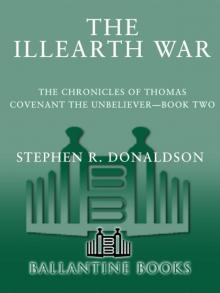 The Illearth War
The Illearth War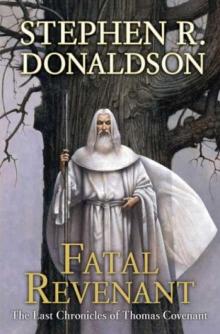 Last Chronicles of Thomas Covenant 02 - Fatal Revenant
Last Chronicles of Thomas Covenant 02 - Fatal Revenant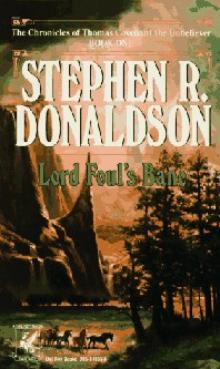 Lord Foul's Bane
Lord Foul's Bane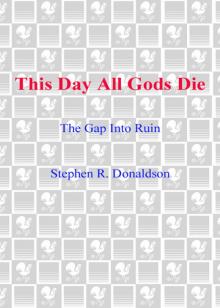 The Gap Into Ruin: This Day All Gods Die
The Gap Into Ruin: This Day All Gods Die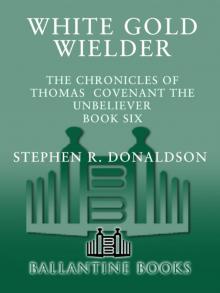 White Gold Wielder
White Gold Wielder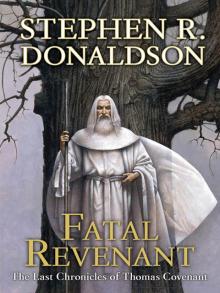 Fatal Revenant
Fatal Revenant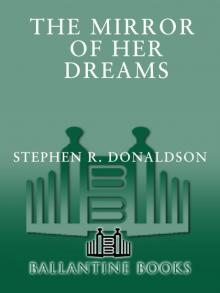 The Mirror of Her Dreams
The Mirror of Her Dreams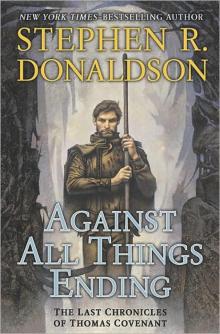 Against All Things Ending
Against All Things Ending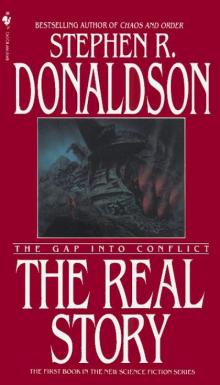 The Real Story: The Gap Into Conflict
The Real Story: The Gap Into Conflict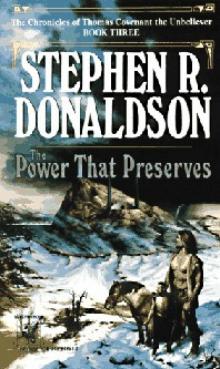 The Power That Preserves
The Power That Preserves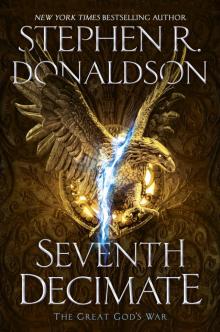 Seventh Decimate
Seventh Decimate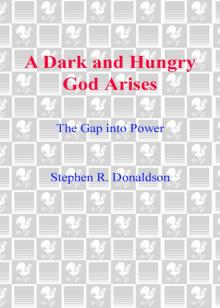 The Gap Into Power: A Dark and Hungry God Arises
The Gap Into Power: A Dark and Hungry God Arises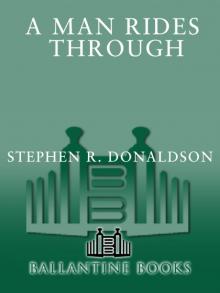 A Man Rides Through
A Man Rides Through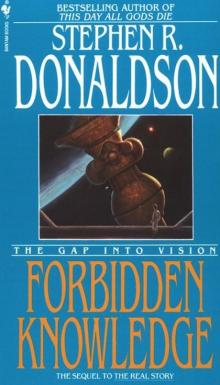 The Gap Into Vision: Forbidden Knowledge
The Gap Into Vision: Forbidden Knowledge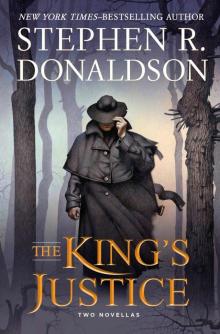 The King's Justice: Two Novellas
The King's Justice: Two Novellas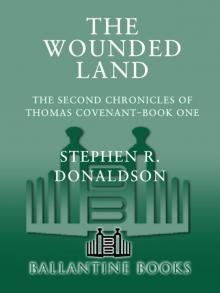 The Wounded Land
The Wounded Land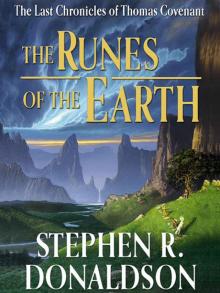 The Runes of the Earth
The Runes of the Earth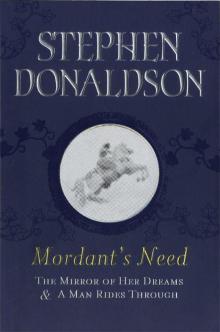 Mordant's Need
Mordant's Need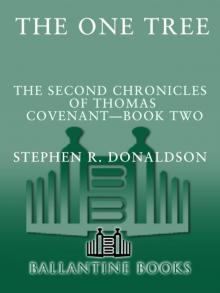 The One Tree
The One Tree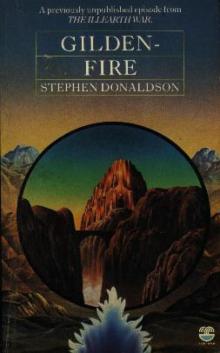 Gilden-Fire
Gilden-Fire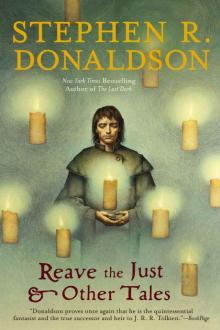 Reave the Just and Other Tales
Reave the Just and Other Tales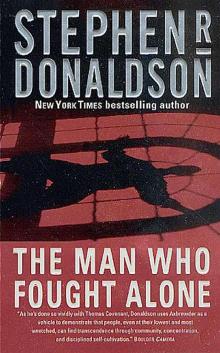 The Man Who Fought Alone
The Man Who Fought Alone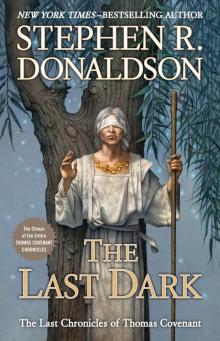 The Last Dark
The Last Dark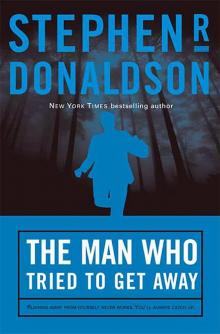 The Man Who Tried to Get Away
The Man Who Tried to Get Away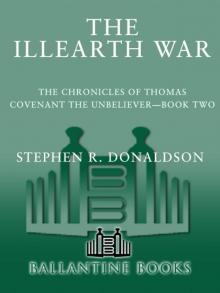 Thomas Covenant 02: The Illearth War
Thomas Covenant 02: The Illearth War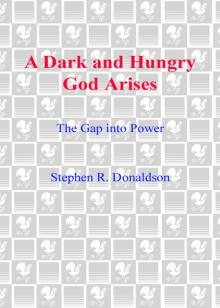 A Dark and Hungry God Arises
A Dark and Hungry God Arises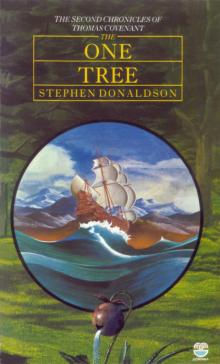 The One Tree t2cotc-2
The One Tree t2cotc-2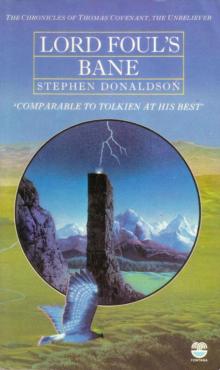 Lord Foul's Bane cotc-1
Lord Foul's Bane cotc-1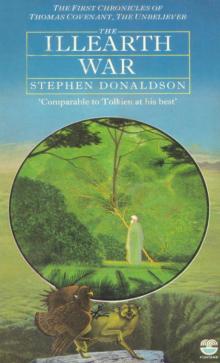 The Illearth War t1cotc-2
The Illearth War t1cotc-2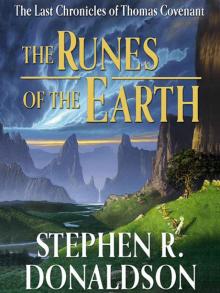 The Runes of the Earth: The Last Chronicles of Thomas Covenant - Book One
The Runes of the Earth: The Last Chronicles of Thomas Covenant - Book One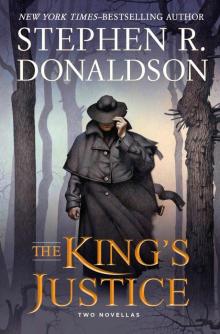 The King's Justice
The King's Justice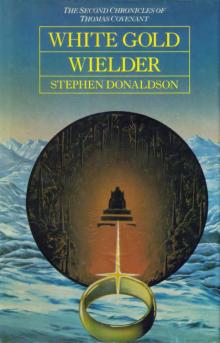 White Gold Wielder t2cotc-3
White Gold Wielder t2cotc-3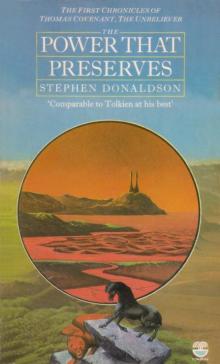 The Power That Preserves t1cotc-3
The Power That Preserves t1cotc-3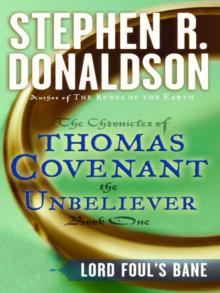 Thomas Covenant 01: Lord Foul's Bane
Thomas Covenant 01: Lord Foul's Bane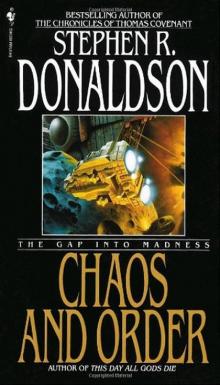 Chaos and Order: The Gap Into Madness
Chaos and Order: The Gap Into Madness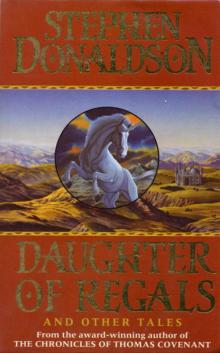 Daughter of Regals
Daughter of Regals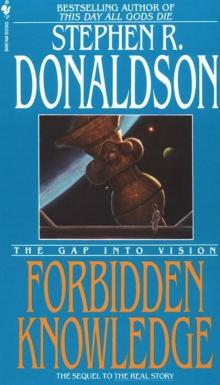 Forbidden Knowledge: The Gap Into Vision
Forbidden Knowledge: The Gap Into Vision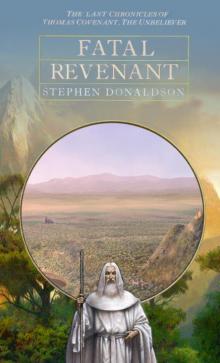 Fatal Revenant t3cotc-2
Fatal Revenant t3cotc-2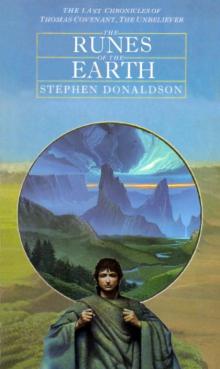 The Runes of the Earth t3cotc-1
The Runes of the Earth t3cotc-1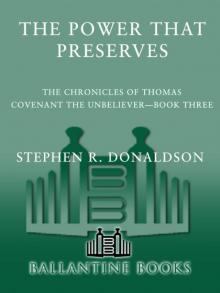 Thomas Covenant 03: Power That Preserves
Thomas Covenant 03: Power That Preserves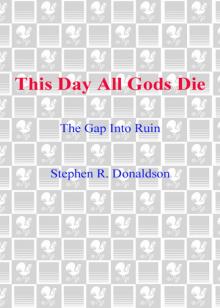 This Day all Gods Die: The Gap into Ruin
This Day all Gods Die: The Gap into Ruin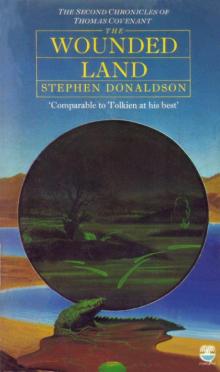 The Wounded Land t2cotc-1
The Wounded Land t2cotc-1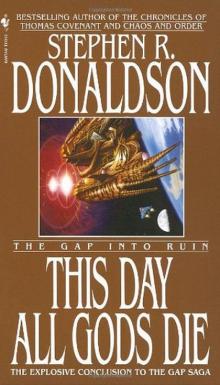 This Day All Gods Die
This Day All Gods Die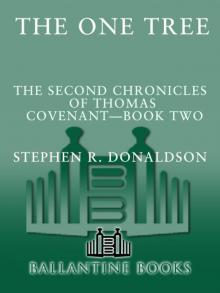 One Tree
One Tree